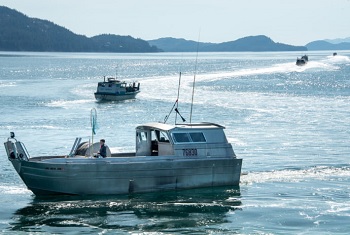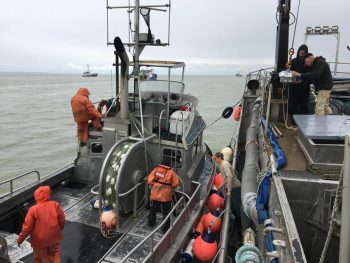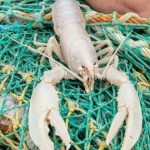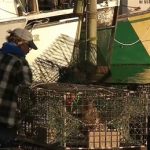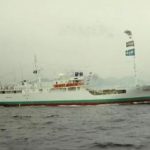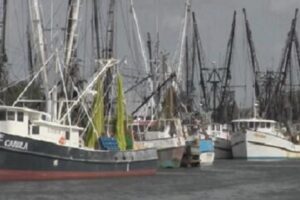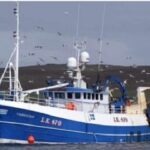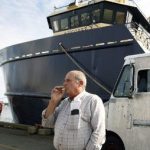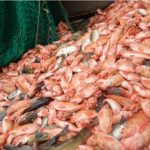Tag Archives: Trident Seafoods
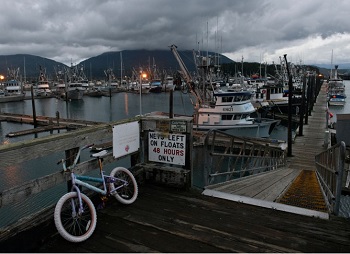
An Alaska commercial fishing season unlike any other kicked off in Cordova on Thursday
Normally, the Copper River gillnet season, the first salmon fishery to open in the state, is known for high-priced fish and celebrity-level fanfare: One of the first fish to be caught is flown to Seattle via Alaska Airlines jet, and greeted with a red carpet photo opportunity. In this pandemic year, things are different all around: The Alaska Airlines first fish photo op will still happen, but the festivities have been tamped down and six-foot distancing and masks are now required. Instead of a cooking contest pitting Seattle chefs against each other, a salmon bake for workers at Swedish Hospital in Ballard is planned. And this year, Cordova’s first-in-the-state salmon fishery will be a high stakes test,,, >click here< 10:15
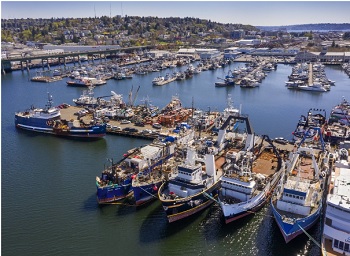
As Alaska fishing season set to begin, fearful communities and seafood industry try to prevent spread of coronavirus
Trident and other seafood-company officials hope to ensure that factory trawlers making their way through remote swaths of the Bering Sea do not replay any of the harrowing scenarios that unfolded on cruise ships this year, when waves of the virus sickened passengers. “The chance of having one hiccup — it’s going to ruin the season for everyone,” Hall said. “The boat has to be virus free.” Processors face another daunting challenge in launching salmon operations in remote Alaska communities, many of which suffered losses in the flu pandemic of more than a century ago and are fearful of thousands of seasonal workers spreading COVID-19. photos, >click to read< 11:43
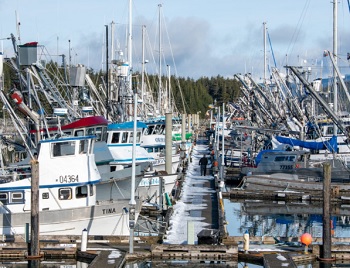
Coronavirus: It’s not business as usual for fishing industry
For Alaska’s commercial fisheries industry in 2020, things will hardly be business as usual. Reports of the first case of novel coronavirus in the state prompted processors to get to work developing plant and vessel response plans in consultation with medical experts to assure the health and safety of employees, harvesters, communities they work in and the fish they will process by the ton. “Everyone is working on it on a regular basis,” said Norm Van Vactor, president and chief executive officer of the Bristol Bay Economic Development Corp. in Dillingham. “It is literally a plan in progress. We are moving forward with a positive attitude (but) nobody is in La La Land.” >click to read< 18:15
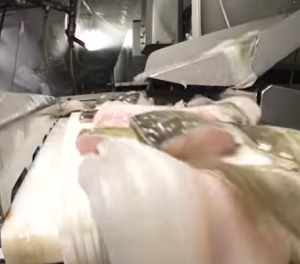
Coronavirus: Seafood processors respond to COVID-19 with added precautions
Seafood industry processors say they are in ongoing discussions with local, state and federal partners,,, The seafood industry talking points including working around the clock on prevention and response, coordinating with partners that include public health officials, preventing the spread of COVID-19 within Alaska and keeping seafood safe, said Stephanie Madsen, executive director of the At-Sea Processors Association. The Seattle-based trade association represents six member companies who own and operate 16 U.S. flagged catcher/processor vessels participating principally in the Alaska Pollock fishery and West Coast Pacific whiting fishery. The group includes American Seafoods Co., Arctic Storm Management Group LLC, Coastal Villages Region Fund, Glacier Fish Company LLC, Aleutian Spray Fisheries Inc. and Trident Seafoods. >click to read< 20:56

Alaska canned pink salmon purchased for food assistance programs
Millions of pounds of Alaska’s 2019 harvest of pink salmon is now earmarked for child nutrition and related domestic food assistance programs, thanks to a U.S. Department of Agriculture purchase of over $25 million in canned product from four processors. USDA officials announced on Sept. 20 the purchase of 442.3 million cases of one-pound tall cans of pink salmon for the federal agency’s food assistance programs,,, >click to read< 10:36
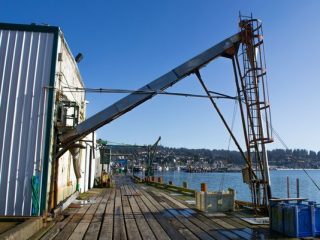
Trident Seafoods fined a third time for polluting Newport’s Yaquina Bay
Oregon environmental regulators have fined Trident Seafoods Corp. $43,200 for wastewater violations at its Newport surimi factory. It’s the third time since 2015 the state Department of Environmental Quality has fined the company for polluting Yaquina Bay. Seattle-based Trident Seafoods is the largest seafood company in the United States and among the largest in the world.
In Newport, the company holds a permit to discharge treated fish-processing wastewater into the bay from its factory, at 623 Yaquina Bay Boulevard, which processes fish into the imitation crab meat. >click to read<11:52
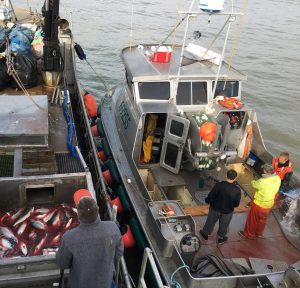
How much Bristol Bay processors will pay for salmon
The question on every Bristol Bay fisherman’s mind at this point in the season is base price: How much cash am I going to get for my salmon? A few Bristol Bay processors said they’re still waiting on their corporate headquarters to release prices, but here’s what we do know as of Tuesday: On Monday, Copper River Seafoods raised its price from $1.30 to $1.70 per pound for chilled, bled and separated sockeye only. Kings larger than 11 pounds bring in $3 per pound, and smaller kings go for $2 a pound. Copper River is paying 80 cents per pound on silvers, 45 cents per pound on chum and 30 cents per pound for pinks. Trident Seafoods is paying,,, >click to read<11:02
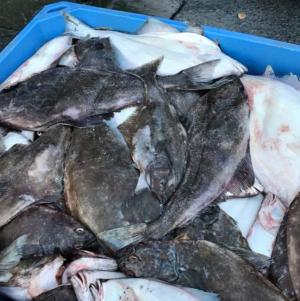
Halibut trash
Only in Alaska, which likes to claim title to the world’s “best-managed fisheries,” would halibut now retailing at prices in excess of $20 per pound be ground into fish meal to feed animals, shrimp and maybe even farmed salmon – the bane of Alaska commercial fishermen. Photos of halibut and other, trawl-caught bottomfish headed for the grinder emerged from Kodiak this weekend as Alaska fishermen started into a fishing season where the targeted harvest of halibut by both commercial fishermen and anglers has been seriously restricted because of conservation concerns. >click to read<18:20
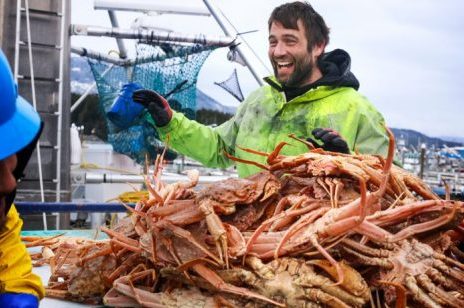
Cordova receives first Tanner crab delivery in 30 years
Deckhands Robert Bernard and Danny Delozier moved energetically around the F/V Ace as it docked at Trident Seafoods. Delozier stood on top of 15 or so crab pots, holding on to a rope while waiting for the first bucket to drop on March 13 to fill with Tanner crabs, the first such delivery in Cordova since 1988. Once the cloudy water drained from the fish hold, piles of bright red, orange and brown Tanner crabs emerged.,, “We had a great crew,” said F/V Ace captain Ronald Blake, as he geared up for another trip into the Sound. “They were hootin’ and hollerin’,” >click to read<18:40
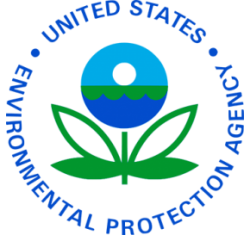
Seafood processor will pay $300,000 fine for oversized fish waste piles at two Alaska plants
Trident Seafoods has agreed to pay a $300,000 penalty and remove an underwater pile of seafood waste near Sand Point in a settlement with the federal government involving Clean Water Act violations at two Alaska plants. The infractions also involve the Seattle-based company’s seafood processing plant at Wrangell in Southeast Alaska, the Environmental Protection Agency said Thursday. At both facilities, Trident exceeded the one-acre limit on seafood processing waste piles it can discard into the water under its permits, the agency said. >click to read< 11:40
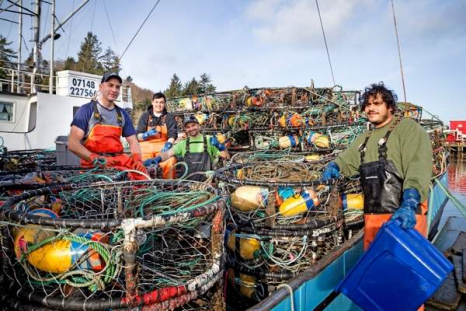
Dangerous swells will complicate harvest this week as Crabbers go to sea
An informal Dungeness crab price strike ended this week on the Washington and Oregon coast after Newport-based crabbers decided to accept $2.75 a pound from Trident Seafoods. Columbia River-based crabbers began soaking pots at 9 a.m. Monday. Crabbers didn’t reach a formal agreement with industry giant Pacific Seafoods after days of stalemated talks in which fishermen sought a starting price of $3 a pound for wholesale deliveries to processors. Last year’s price was $2.89 a pound. >click here to read< 11:53
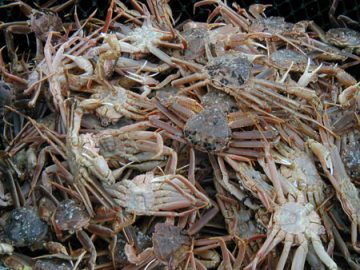
Snow crab landing in Bering Sea
The Bering Sea opilio snow crab fishery is slowly moving forward, with 2 percent of the quota landed. Eight vessels made nine landings for a total weight in the past week of some 471,000 pounds, from a quota of 18.5 million pounds, according to the Alaska Department of Fish and Game in Unalaska. The number of snow crab per pot is down somewhat from the same period last year. The most recent count was 201 crustaceans last week, down from 238 last year, according to Fish and Game. “From talking to the fleet, it’s been a slow start for the boats that are out there opie fishing,” said state fisheries biologist Ethan Nichols. But it’s likely to pick up, >click here to read<17:53
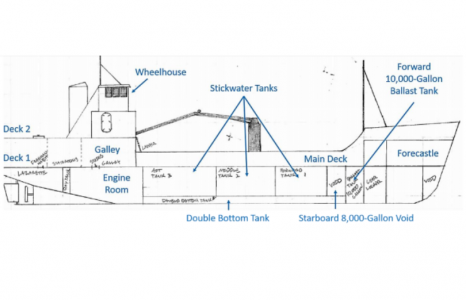
NTSB: Lack of preparation, training a factor in death of 2 on Alaska crab boat
On December 6, 2016, the motor vessel Exito slipped below the surface of icy Dutch Harbor waters, never to be seen again. Aboard when it sank were two men, contractors for Trident Seafoods. Their bodies were never recovered. Now, over two years later, the National Transportation Safety Board has released a report detailing several factors that it says could have saved the two men. click here to read the story 16:53
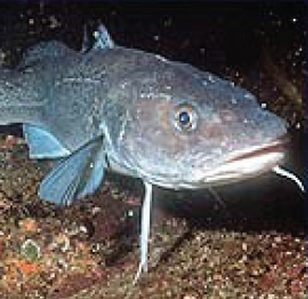
Bering Sea cod conflict brewing between on and offshore buyers
“Cod Alley” is getting crowded, and some fishermen want to limit the boats in the narrow congested fishing area in the Bering Sea. The North Pacific Fishery Management Council is looking at changes, including restricting flatfish factory trawlers from buying cod offshore. The Pacific Seafood Processors Association is pushing for restrictions on factory trawlers to protect its members’ shore plants in Unalaska, Akutan, King Cove and Sand Point. According to the PSPA’s Nicole Kimball, seven factory trawlers bought cod from 17 catcher boats in 2017,,, click here to read the story 21:23
Alaska tops nation in total fishing volume for 20th year
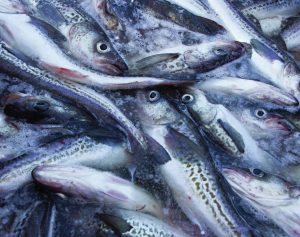 The annual report detailing national and regional economic impacts of U.S. fisheries totaled $9.6 billion in value in 2016 with Alaska as usual producing more than the rest of the nation combined. Alaska produced 58 percent of all landings and for the 20th straight year brought in the highest volume, according to the 2016 Fisheries of the United States report by the National Marine Fisheries Service. The top spot for all ports in the nation went to Dutch Harbor, which brought in 770 million pounds with Alaska pollock accounting for 89 percent of that volume. click here to read the story 16:43
The annual report detailing national and regional economic impacts of U.S. fisheries totaled $9.6 billion in value in 2016 with Alaska as usual producing more than the rest of the nation combined. Alaska produced 58 percent of all landings and for the 20th straight year brought in the highest volume, according to the 2016 Fisheries of the United States report by the National Marine Fisheries Service. The top spot for all ports in the nation went to Dutch Harbor, which brought in 770 million pounds with Alaska pollock accounting for 89 percent of that volume. click here to read the story 16:43
Alaska fisheries thrive — yet industry is on the edge
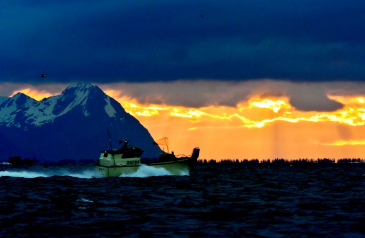 It has been a really good year across most of Alaska’s commercial fisheries. Salmon prices are up, harvests are good, fuel costs are down, and there’s more: The world’s appetite for nutritious, wild-caught Alaska fish, caught in clean waters, is growing. Alaskans’ track record for managing fisheries in a sustainable manner, both near-shore and further at sea, reinforces our reputation for responsible stewardship. Life is good.,,, Seafood employed 56,800 workers in 2015-2016 and this industry annually contributes $5.2 billion to the state’s economic output. But as good as this sounds, the fact is that this traditional industry is actually fragile,,, click here to read the story 21:45
It has been a really good year across most of Alaska’s commercial fisheries. Salmon prices are up, harvests are good, fuel costs are down, and there’s more: The world’s appetite for nutritious, wild-caught Alaska fish, caught in clean waters, is growing. Alaskans’ track record for managing fisheries in a sustainable manner, both near-shore and further at sea, reinforces our reputation for responsible stewardship. Life is good.,,, Seafood employed 56,800 workers in 2015-2016 and this industry annually contributes $5.2 billion to the state’s economic output. But as good as this sounds, the fact is that this traditional industry is actually fragile,,, click here to read the story 21:45
At Seattle-based seafood giant Trident, a new generation is at the helm
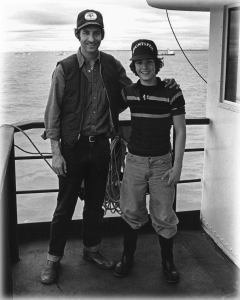 Joe Bundrant’s first Alaska summer with Trident Seafoods was back in 1979, a tense time for the Seattle-based company founded by his father Chuck Bundrant. The Bristol Bay salmon run was in full swing. But a bitter strike over low prices kept nets out the water, and shut down the regional harvest. Chuck Bundrant had piled up debt to build the Bountiful, a 165-foot processing vessel that was then only a year old. He didn’t want it to sit idle. So, he urged the fishermen to cross the picket line and allow him to freeze their sockeye catch. When the season was over, he pledged to settle with them on a fair market value “He just said, ‘Trust me.’ And those guys went fishing. It was a very powerful lesson for a young guy,” click here to read the story 12:35
Joe Bundrant’s first Alaska summer with Trident Seafoods was back in 1979, a tense time for the Seattle-based company founded by his father Chuck Bundrant. The Bristol Bay salmon run was in full swing. But a bitter strike over low prices kept nets out the water, and shut down the regional harvest. Chuck Bundrant had piled up debt to build the Bountiful, a 165-foot processing vessel that was then only a year old. He didn’t want it to sit idle. So, he urged the fishermen to cross the picket line and allow him to freeze their sockeye catch. When the season was over, he pledged to settle with them on a fair market value “He just said, ‘Trust me.’ And those guys went fishing. It was a very powerful lesson for a young guy,” click here to read the story 12:35
Federal Judge Evokes Dr. Seuss in Upholding Seafood Regulations
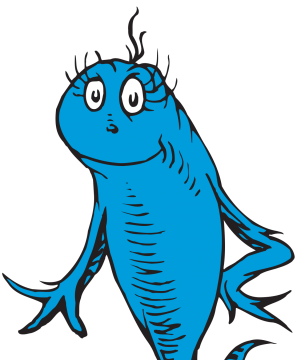 Invoking Dr. Seuss, a federal judge on Monday quoted from the 1960 classic “One Fish Two Fish Red Fish Blue Fish” to uphold a regulatory regime intended to cut down on seafood fraud and protect U.S. fishers from unfair competition. Despite a challenge to the rule by a slew of U.S. seafood importers, harvesters and processors, U.S. District Judge Amit Mehta found that the traceability rule, which requires importers to document the supply chain of imports from their origin to their arrival in the U.S., was lawfully implemented by the National Marine Fisheries Service. click here to read the story 18:32
Invoking Dr. Seuss, a federal judge on Monday quoted from the 1960 classic “One Fish Two Fish Red Fish Blue Fish” to uphold a regulatory regime intended to cut down on seafood fraud and protect U.S. fishers from unfair competition. Despite a challenge to the rule by a slew of U.S. seafood importers, harvesters and processors, U.S. District Judge Amit Mehta found that the traceability rule, which requires importers to document the supply chain of imports from their origin to their arrival in the U.S., was lawfully implemented by the National Marine Fisheries Service. click here to read the story 18:32
Hiring seafood workers in Bristol Bay has been tough for years. This summer, it’s worse.
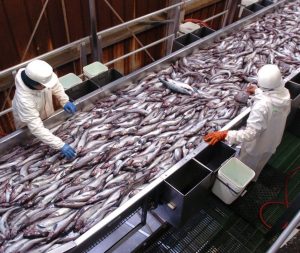 Seafood processors in Alaska’s Bristol Bay this summer have had trouble finding enough workers to handle the fish that come through their plants. Those in the industry say a confluence of factors, including a lack of visas for bringing foreign workers to the industry, a hotter economy in the Lower 48, and a record-breaking salmon run in Bristol Bay, was to blame. “There was a significant lack of process workers for some companies in the bay, and it exacerbated the problems of having to deal with high levels of harvest,” said John Garner, president of Seattle-based North Pacific Seafoods, which has locations across Alaska. Some processors couldn’t keep up with the huge amount of fish coming in, which forced them to resort to whatever method was fastest to get the pounds through the plant. click here to read the story 10:03
Seafood processors in Alaska’s Bristol Bay this summer have had trouble finding enough workers to handle the fish that come through their plants. Those in the industry say a confluence of factors, including a lack of visas for bringing foreign workers to the industry, a hotter economy in the Lower 48, and a record-breaking salmon run in Bristol Bay, was to blame. “There was a significant lack of process workers for some companies in the bay, and it exacerbated the problems of having to deal with high levels of harvest,” said John Garner, president of Seattle-based North Pacific Seafoods, which has locations across Alaska. Some processors couldn’t keep up with the huge amount of fish coming in, which forced them to resort to whatever method was fastest to get the pounds through the plant. click here to read the story 10:03
The Man Who Got Americans to Eat Trash Fish Is Now a Billionaire
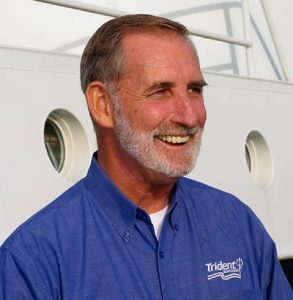 Chuck Bundrant was a college freshman with $80 in his pocket when he drove halfway across the country to Seattle to earn a few bucks fishing. The year was 1961. He hasn’t stopped fishing since. And today, Bundrant, the founder and majority owner of Trident Seafoods, is worth at least $1.1 billion, according to the Bloomberg Billionaires Index.,,, Chuck Bundrant’s story is the stuff of industry legend. “He knew nothing about fishing boats, or catching and processing crab and salmon,’’ son Joe said in a corporate video two years ago. “He’d only watched a movie with John Wayne in it called ‘North to Alaska.’ And he heard there was money to be made on the fishing grounds, thousands and thousands of miles from home.’’ After a few years, Bundrant was looking for a way to start a business in the industry. He met two other crab fishermen — Kaare Ness and Mike Jacobson — and in 1973 the three put their money together and built the Billikin, a 135-foot boat that changed the seafood industry, according to Trident’s corporate history. click here to read the story 19:06
Chuck Bundrant was a college freshman with $80 in his pocket when he drove halfway across the country to Seattle to earn a few bucks fishing. The year was 1961. He hasn’t stopped fishing since. And today, Bundrant, the founder and majority owner of Trident Seafoods, is worth at least $1.1 billion, according to the Bloomberg Billionaires Index.,,, Chuck Bundrant’s story is the stuff of industry legend. “He knew nothing about fishing boats, or catching and processing crab and salmon,’’ son Joe said in a corporate video two years ago. “He’d only watched a movie with John Wayne in it called ‘North to Alaska.’ And he heard there was money to be made on the fishing grounds, thousands and thousands of miles from home.’’ After a few years, Bundrant was looking for a way to start a business in the industry. He met two other crab fishermen — Kaare Ness and Mike Jacobson — and in 1973 the three put their money together and built the Billikin, a 135-foot boat that changed the seafood industry, according to Trident’s corporate history. click here to read the story 19:06
Trident Seafoods officially opens $40m East Coast plant, which is expected to employ 175 workers
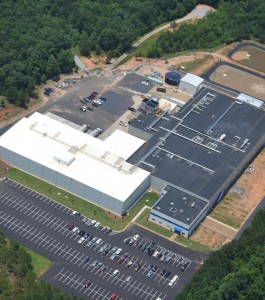 Seattle, Washington-based Trident Seafoods on Thursday officially opened the company’s $40 million value-added processing and research and development plant in Carrollton, Georgia, the company said. The plant comes as the company said it intends to grow business in the eastern United States. With an 88,000-square-foot manufacturing floor, 18,000 square feet of office space and 20,000 square feet of support area, the plant will produce seafood products cut from pollock, cod, salmon, halibut, tilapia, sole and mahi mahi. Read the rest here 13:31
Seattle, Washington-based Trident Seafoods on Thursday officially opened the company’s $40 million value-added processing and research and development plant in Carrollton, Georgia, the company said. The plant comes as the company said it intends to grow business in the eastern United States. With an 88,000-square-foot manufacturing floor, 18,000 square feet of office space and 20,000 square feet of support area, the plant will produce seafood products cut from pollock, cod, salmon, halibut, tilapia, sole and mahi mahi. Read the rest here 13:31
Odoriferous : Trident engineers address odor issues at plant
 Residents throughout town have been noticing the smell since early July. “My wife was commenting on it just the other day,” said Jerry Pirtle, a local gillnetter. “The smell is bad. Especially on a day like today with a westerly wind and you just want to be out enjoying the weather.” Pirtle, whose home is on 1st Street, on the hill over-looking Trident’s plant. “It’s pretty dissatisfying,” he said. Isaacson said the company has received phones calls and emails from residents. At least one local turned to graffiti to send his message. Read the rest here 08:36
Residents throughout town have been noticing the smell since early July. “My wife was commenting on it just the other day,” said Jerry Pirtle, a local gillnetter. “The smell is bad. Especially on a day like today with a westerly wind and you just want to be out enjoying the weather.” Pirtle, whose home is on 1st Street, on the hill over-looking Trident’s plant. “It’s pretty dissatisfying,” he said. Isaacson said the company has received phones calls and emails from residents. At least one local turned to graffiti to send his message. Read the rest here 08:36
Russian pollock sector soon to be as consolidated as US – 2 Foreign Companies OWN 50% of all US POLLOCK
 The industry will follow the model of the US pollock sector, with the top five Russian companies controlling 80% of the quota in 2015-2016, states Osadchiy’s presentation from the event, held last week in Bergen, Norway. In the US, Trident Seafoods, Maruha Nichiro, Nippon Suisan Kaisha (Nissui) and American Seafoods Group control 80% of the TAC. Trident has 25% of the TAC, Maruha Nichiro, through its mothership vessels and Westward Seafoods and Alyeska Seafoods processing plants, has 22%; Nissui has 18% through Unisea; with American Seafoods and its fleet of factory vessels harvesting 16%. Read the rest here 18:59
The industry will follow the model of the US pollock sector, with the top five Russian companies controlling 80% of the quota in 2015-2016, states Osadchiy’s presentation from the event, held last week in Bergen, Norway. In the US, Trident Seafoods, Maruha Nichiro, Nippon Suisan Kaisha (Nissui) and American Seafoods Group control 80% of the TAC. Trident has 25% of the TAC, Maruha Nichiro, through its mothership vessels and Westward Seafoods and Alyeska Seafoods processing plants, has 22%; Nissui has 18% through Unisea; with American Seafoods and its fleet of factory vessels harvesting 16%. Read the rest here 18:59
Western Alaska Fisheries cannery in Kodiak Sale Price is $37-Million
 A few weeks ago when KMXT first told you of Trident Seafood’s purchase of the Western Alaska Fisheries cannery in Kodiak, CEO Joe Bundrant declined to reveal the sale price, saying as a privately-owned company, they preferred to keep such information private. However, the company Trident purchased Western from, Japan-based Maruha Nichiro, is a publicly-traded company, and as such must report its financial dealings. Read the rest here 11:54
A few weeks ago when KMXT first told you of Trident Seafood’s purchase of the Western Alaska Fisheries cannery in Kodiak, CEO Joe Bundrant declined to reveal the sale price, saying as a privately-owned company, they preferred to keep such information private. However, the company Trident purchased Western from, Japan-based Maruha Nichiro, is a publicly-traded company, and as such must report its financial dealings. Read the rest here 11:54
Trident Seafoods to acquire Western Alaska Fisheries’ Japanese owned assets
 US-based Trident Seafoods has agreed to acquire the assets of Western Alaska Fisheries in Kodiak, Alaska, from Westward Seafoods, which is owned by Maruha-Nichiro. Trident in an announcement Monday says it has signed a letter of intent to purchase the plant. A purchase price was not announced. Read the rest here 17:44
US-based Trident Seafoods has agreed to acquire the assets of Western Alaska Fisheries in Kodiak, Alaska, from Westward Seafoods, which is owned by Maruha-Nichiro. Trident in an announcement Monday says it has signed a letter of intent to purchase the plant. A purchase price was not announced. Read the rest here 17:44
Trident Seafoods charged for late fish tickets
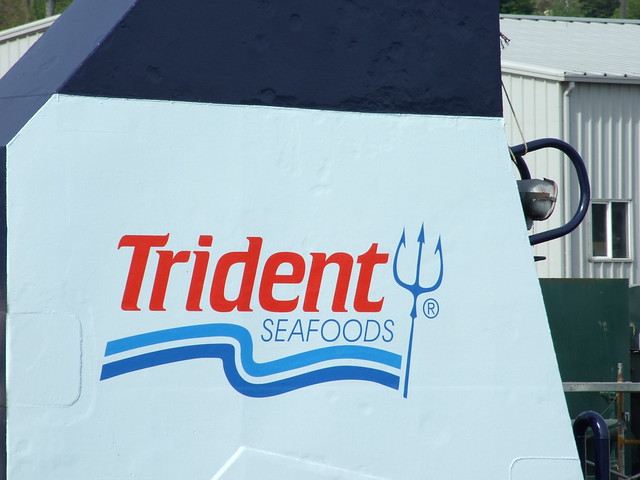 Alaska state law requires commercial fish processors to record each catch on an AFG-approved fish ticket, which must be submitted to a local representative within seven days after landing. Charging documents indicate Trident’s fish tickets were between five and 12 days late. Read the rest here 09:51
Alaska state law requires commercial fish processors to record each catch on an AFG-approved fish ticket, which must be submitted to a local representative within seven days after landing. Charging documents indicate Trident’s fish tickets were between five and 12 days late. Read the rest here 09:51
Nets Mended, Boots Packed. Fish Boats Head For Alaska
 Big factory ships are heading out to sea, and in coming weeks, 10,000 people from Washington state will head north to the Alaska fishing grounds. Half of all the seafood caught in the U.S. comes from the Alaska fishery. Seattle is its base, and the biggest players are the companies that own catcher-processor ships. They include Trident Seafoods, Glacier Fish Company and American Seafoods Group. Crews have spent the last few weeks getting the ships ready. At Interbay’s Pier 91 on Monday, the Northern Eagle, a ship owned by American Seafoods, prepared for its journey. Read more here 19:53:34
Big factory ships are heading out to sea, and in coming weeks, 10,000 people from Washington state will head north to the Alaska fishing grounds. Half of all the seafood caught in the U.S. comes from the Alaska fishery. Seattle is its base, and the biggest players are the companies that own catcher-processor ships. They include Trident Seafoods, Glacier Fish Company and American Seafoods Group. Crews have spent the last few weeks getting the ships ready. At Interbay’s Pier 91 on Monday, the Northern Eagle, a ship owned by American Seafoods, prepared for its journey. Read more here 19:53:34






